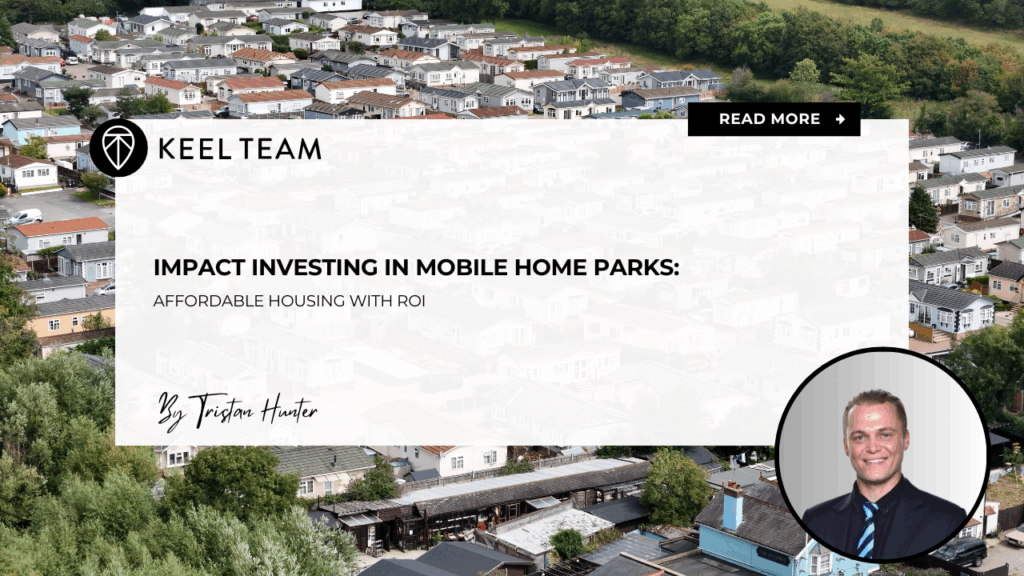Impact Investing in Mobile Home Parks: Affordable Housing with ROI
-
 Tristan Hunter - Investor Relations
Tristan Hunter - Investor Relations

Mobile home parks have increasingly attracted attention from real estate investors, not only for their historical financial returns but also for their social impact. Investing in mobile home parks can create opportunities to provide affordable housing while aiming for positive cash flow. Although no investment can be guaranteed, the structure of mobile home parks can align financial goals with social benefits. This article explores the concept of impact investing in mobile home parks, the potential benefits, strategies for investors, and considerations for responsible management.
Understanding Impact Investing in Mobile Home Parks
Impact investing focuses on generating measurable social or environmental benefits alongside financial returns. In the context of mobile home parks, the social impact typically relates to providing stable and affordable housing for residents. Mobile home parks often house communities that might otherwise struggle with high rental costs, making them an important segment of the affordable housing market.
Investors interested in impact investing in mobile home parks often consider factors such as rent stabilization, property improvements, and community engagement. The goal is to enhance residents’ quality of life while pursuing reasonable returns from lot rents and other operational income. By aligning financial incentives with social outcomes, investors may create a more sustainable investment approach.
Download our FREE eBook on the Top 20 things to know BEFORE investing in mobile home parks!
The Affordable Housing Challenge
Affordable housing remains a challenge in many parts of the country. Rising rent costs and limited housing inventory can leave low- and moderate-income families with few options. Mobile home parks, which generally offer lower-cost housing compared to traditional rental homes, can address this gap.
Investing in mobile home parks can provide opportunities to maintain or improve affordability for residents. Responsible investors may focus on maintaining fair lot rents, upgrading infrastructure, and improving safety and amenities. These measures can enhance resident satisfaction and reduce turnover, which may support long-term occupancy and steady income.
Potential Financial Benefits of Mobile Home Parks
While the social impact is a primary motivation for impact investing, financial considerations remain important. Mobile home parks can potentially offer competitive returns compared to other real estate asset types. Some of the financial benefits may include:
1. Consistent Cash Flow
Mobile home parks generate revenue primarily through lot rents. Unlike traditional rental properties, investors typically do not own the individual homes, reducing maintenance costs and tenant turnover risks. Consistent lot rent collection can provide stable cash flow for investors.
2. Lower Tenant Turnover
Residents of mobile home parks often have longer tenancies compared to renters in conventional apartments. Stability in occupancy can reduce costs associated with marketing, leasing, and maintenance, which can improve net operating income.
3. Value-Add Opportunities
Impact investors can enhance both the social and financial value of a mobile home park by upgrading utilities, improving roads, or adding community amenities. These improvements can justify modest lot rent increases over time, potentially increasing cash flow while improving residents’ quality of life.
4. Diversification Benefits
Including mobile home parks in a real estate portfolio may offer diversification benefits. Since lot rents tend to be less sensitive to market fluctuations than conventional apartment rents, they can provide a stabilizing influence in an investor’s overall holdings.
Strategies for Responsible Mobile Home Park Investing
Investors aiming to combine financial returns with social impact should consider strategies that support both goals. Responsible investment practices may include:
1. Fair Rent Practices
Maintaining affordable lot rents while covering operating costs is critical. Investors may evaluate market conditions carefully to avoid sudden or excessive rent increases that could displace residents.
2. Infrastructure Improvements
Upgrading water, sewer, and road systems can improve living conditions while potentially increasing property value. These investments often require careful planning and budgeting to ensure they align with both social and financial objectives.
3. Community Engagement
Engaging with residents and understanding their needs can build trust and strengthen the community. Simple steps, such as regular communication, resident meetings, or on-site management support, can create positive outcomes.
4. Compliance and Regulation
Mobile home parks are subject to local, state, and federal regulations. Investors should ensure compliance with zoning laws, safety codes, and tenant protection requirements to mitigate legal risks and support responsible management.

Challenges and Considerations
While mobile home parks offer opportunities for impact investing, they also come with challenges. Investors should approach these opportunities with a realistic understanding of risks and limitations.
1. Market Sensitivity
The performance of mobile home parks can be affected by regional economic conditions. Local job markets, population trends, and housing availability may influence occupancy rates and lot rent levels.
2. Property Management Complexity
Managing a mobile home park requires attention to both physical infrastructure and tenant relations. Poor management can lead to vacancies, maintenance issues, and resident dissatisfaction, which may reduce financial returns.
3. Regulatory Changes
Changes in housing regulations, rent control policies, or zoning laws can affect the profitability of mobile home parks. Investors should stay informed about local legislative developments that could impact operations.
4. Ethical Considerations
Balancing profit and social impact requires careful decision-making. Investors may face ethical questions regarding rent increases, eviction practices, or development projects. Transparent communication and ethical policies can help navigate these challenges.
Measuring Impact in Mobile Home Park Investments
Impact measurement is an important component of responsible investing. Investors may track various metrics to assess social outcomes alongside financial performance. Examples include:
- Occupancy Rates: High occupancy suggests stable housing availability for residents.
- Resident Satisfaction: Surveys or feedback systems can indicate how well the park meets community needs.
- Infrastructure Improvements: Tracking upgrades to utilities, roads, or common areas demonstrates tangible improvements in living conditions.
- Affordability Maintenance: Monitoring rent levels in relation to local median income ensures housing remains accessible.
By monitoring these metrics, investors can evaluate whether their mobile home park investments are achieving desired social and financial goals.
Conclusion
Impact investing in mobile home parks can potentially provide a balance between affordable housing and financial returns. By focusing on responsible management, infrastructure improvements, and community engagement, investors may support social outcomes while seeking reasonable income from lot rents. However, no investment can guarantee outcomes, and market conditions, management decisions, and regulatory changes can affect results.
Investors considering mobile home parks for impact purposes should carefully evaluate each opportunity, understand the associated risks, and maintain a clear strategy that aligns financial and social goals. With careful planning and thoughtful management, mobile home parks can offer an avenue for investing that considers both people and profit.
Are you looking for MORE information? Book a 1-on-1 consultation with Andrew Keel to discuss:
- A mobile home park deal review
- Due diligence questions
- How to raise capital from investors
- Mistakes to avoid, and more!
Disclaimer:
The information provided is for informational purposes only and is not investment advice or a guarantee of any kind. We do not guarantee profitability. Make investment decisions based on your research and consult registered financial and legal professionals. We are not registered financial or legal professionals and do not provide personalized investment recommendations.

Tristan Hunter - Investor Relations
View The Previous or Next Post
Subscribe Below 👇





